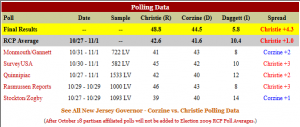Well, that would have to be the alternative explanation to what’s apparently happening, which is that the governor’s race is tightening in Virginia again. Cuccinelli/McAuliffe went from 42/48 in August’s Q-Poll to 41/44 now.
The poll indicates McAuliffe, the former chairman of the Democratic National Committee, at 44% among likely commonwealth voters, with Cuccinelli at 41%. The three point margin for McAuliffe, who lost a bid for the 2009 Democratic gubernatorial nomination, is within the survey’s sampling error.
[snip]
The new poll suggests that Robert Sarvis, the Libertarian candidate who stands at 7%, could hold a key to the November election.
And that last factoid reminds me of the 2009 governor’s race, actually. Only, the one in NJ.
You might not remember this one: Christie/Corzine was one of those that superficially looked a lot more competitive than it actually was. And the reason? Overstating third-party performance:

Turns out that only about half the people who were supposedly voting for Daggett actually did: the rest mostly broke for Christie, thus giving him the election by a rather higher margin than RCP’s rule-of-thumb assessment would have suggested. Which is not surprising, given the way that third parties work in NJ:
| Year | Top 3rd | 2PV |
| 2009 | 6% | 93% |
| 2005 | 1% | 96% |
| 2001 | 1% | 98% |
| 1997 | 5% | 93% |
As the chart shows*, New Jersey elections are not particularly friendly to third parties: the six or so percent that Daggett received was easily in line with what New Jersey typically gives its top third party candidate in any given election. I would like to note, by the way, that I’ve been saying this about NJ and third parties in general for some time (both before [see also here] and after the 2009 election); this is not something that I’ve cooked up for this discussion.
I mention that because now let’s look at the VA third party vote situation.
| Year | All 3rd | 2PV |
| 2009 | 0% | 100% |
| 2005 | 2% | 98% |
| 2001 | 1% | 99% |
| 1997 | 2% | 98% |
| 1993 | 1% | 99% |
| 1989 | 0% | 100% |
| 1985 | 0% | 100% |
| 1981 | 0% | 100% |
Highlighted in red are elections where a third party candidate managed to get on the Virginia ballot; as you can see, the reward for such perseverance is typically somewhere between 1 and 2% of the vote. This is relevant because you have to drill down on the polls showing the current RCP average for the Virginia race:

The breakdown is as follows:
- Quinnipac: Libertarian gets 7%.
- Harper: Libertarian gets 10%.
- Purple Strategies: …Did not poll for third party. They’re listing 19% as not sure.
- Rasmussen: “Some other candidate” gets 7%.
Now, it may very well be that this time the pollsters are detecting a genuine, sustainable Libertarian party surge in a state that has never been known for that sort of thing. Certainly the Libertarians would argue that! Or it could mean that Purple Strategies is correct, and that one-fifth of the electorate has simply not made up its mind yet, six weeks out. That honestly sounds more likely to me – and yes, I’m aware that it’s also the ‘better’ answer for the Republican party, thus making it automatically suspect.
Still, a tightening poll situation isn’t good news for the Democrats. Because the goal for them is to open up a lead – not least because Terry McAuliffe is apparently really bad at campaigning…
Moe Lane (crosspost)
PS: It hardly needs to be said, but: Ken Cuccinelli for Governor.
*Numbers for those two charts from Wikipedia, on the principle that surely they can get election results correct.

I hope you’re right moe. Cuccinelli is a fine conservative a loss would be a terrible blow. McAuliffe will buttrape Virginia. Then he’ll hand her over soiled to O’Malley.
What, no PPP polls? I thought guessing at the makeup of the electorate to favor the Dems was *their* rap…
.
Mew
PPP has been quietly but steadily losing their reputation over the last couple of years. Being dKos’s polling firm apparently does that to you; it’s probably a variant of the Mummy’s Curse.
Not to mention, last two weeks Nate Cohn has just been brutal to PPP in his column. He has shamed Silver and Blumnethal to basically just saying, “yeah, what Cohn said”…
Of course, Jay Cost and Sean Davis were on PPP’s case for sloppy methodology a year ago but they didn’t count because Republican.
Yep .. my point was more that we’ve seen this ‘over-stating the electorate to get tailored results’ technique before somewhere ..
.
(unless you think they’re just being stupid …)
.
Mew
So, even if correct, it probably (almost certainly) doesn’t mean much (anything at all).